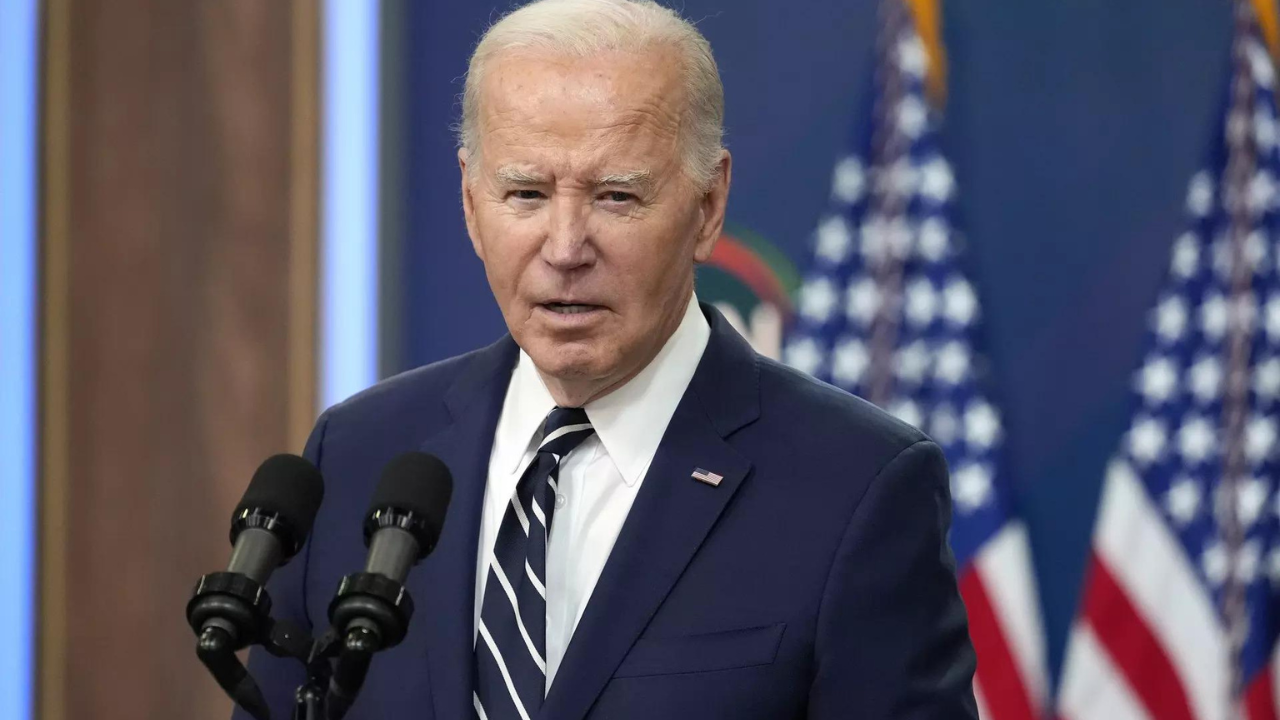[ad_1]
WASHINGTON: US President Joe Biden hailed his administration’s efforts to close the racial wealth gap, one of the country’s most persistent inequalities, in a speech to Reverend Al Sharpton’s racial justice conference in New York on Friday.
Biden, who is working to shore up support among Black voters ahead of his November rematch with former President Donald Trump, contrasted his policies with Republican efforts to cut funding for racial equity initiatives, state-provided health insurance, and social security.
“Black wealth is up 60% … and the racial wealth gap has closed the most in 20 years. You know, I would argue this is transformational change. But we know there’s much more work to do,” Biden told participants in a virtual speech.
He said Black Americans and other communities of color were particularly impacted by threats such as voter suppression, election subversion, moves to reverse reproductive rights, and political violence.
“There are more extreme voices out there who simply don’t want to see people of color in the future of our country,” he said. “These extremists are determined to erase the progress we’ve made. But together, we are determined to make history, not erase it.”
New data from the Federal Housing Finance Agency shows a 40% cut in the gap between home appraisals in majority white communities versus those in communities of color after the agency started to crack down on what it calls appraisal bias, the White House said.
Home appraisals are just one factor in a wealth gap that has persisted for years, fed by federal and local policies on everything from hiring practices to highway construction.
Some data shows it is getting worse, despite Biden’s efforts.
Inflation-adjusted wealth of white households in the US grew faster than that of Black and Hispanic households from the start of 2019 through the third quarter of last year, with Black households in particular worse off than they were before the pandemic, a New York Fed study released in February concluded.
Biden won the 2020 election with 92% backing from Black Americans, but their support is less certain this year, with a Pew Research Center poll in January finding about 49% of Black adults disapproved of Biden’s performance.
Biden also announced that a record $76.2 billion, or 12.1%, of federal contracting dollars went to small disadvantaged businesses in fiscal 2023, close to his goal of reaching 15% of such contracts by 2025.
White House economists say eliminating disparities in business ownership rates would narrow the racial wealth gap.
Biden, who is working to shore up support among Black voters ahead of his November rematch with former President Donald Trump, contrasted his policies with Republican efforts to cut funding for racial equity initiatives, state-provided health insurance, and social security.
“Black wealth is up 60% … and the racial wealth gap has closed the most in 20 years. You know, I would argue this is transformational change. But we know there’s much more work to do,” Biden told participants in a virtual speech.
He said Black Americans and other communities of color were particularly impacted by threats such as voter suppression, election subversion, moves to reverse reproductive rights, and political violence.
“There are more extreme voices out there who simply don’t want to see people of color in the future of our country,” he said. “These extremists are determined to erase the progress we’ve made. But together, we are determined to make history, not erase it.”
New data from the Federal Housing Finance Agency shows a 40% cut in the gap between home appraisals in majority white communities versus those in communities of color after the agency started to crack down on what it calls appraisal bias, the White House said.
Home appraisals are just one factor in a wealth gap that has persisted for years, fed by federal and local policies on everything from hiring practices to highway construction.
Some data shows it is getting worse, despite Biden’s efforts.
Inflation-adjusted wealth of white households in the US grew faster than that of Black and Hispanic households from the start of 2019 through the third quarter of last year, with Black households in particular worse off than they were before the pandemic, a New York Fed study released in February concluded.
Biden won the 2020 election with 92% backing from Black Americans, but their support is less certain this year, with a Pew Research Center poll in January finding about 49% of Black adults disapproved of Biden’s performance.
Biden also announced that a record $76.2 billion, or 12.1%, of federal contracting dollars went to small disadvantaged businesses in fiscal 2023, close to his goal of reaching 15% of such contracts by 2025.
White House economists say eliminating disparities in business ownership rates would narrow the racial wealth gap.
[ad_2]
Source link


